.gif)
Victory Day (Eastern Europe)
Encyclopedia

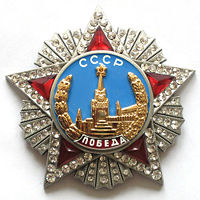
Capitulation (treaty)
A capitulation , or ahidnâme, is a treaty or unilateral contract by which a sovereign state relinquishes jurisdiction within its borders over the subjects of a foreign state...
of Nazi Germany
Nazi Germany
Nazi Germany , also known as the Third Reich , but officially called German Reich from 1933 to 1943 and Greater German Reich from 26 June 1943 onward, is the name commonly used to refer to the state of Germany from 1933 to 1945, when it was a totalitarian dictatorship ruled by...
to the Soviet Union
Soviet Union
The Soviet Union , officially the Union of Soviet Socialist Republics , was a constitutionally socialist state that existed in Eurasia between 1922 and 1991....
in the Second World War (also known as the Great Patriotic War in the Soviet Union
Soviet Union
The Soviet Union , officially the Union of Soviet Socialist Republics , was a constitutionally socialist state that existed in Eurasia between 1922 and 1991....
and all post-Soviet states
Post-Soviet states
The post-Soviet states, also commonly known as the Former Soviet Union or former Soviet republics, are the 15 independent states that split off from the Union of Soviet Socialist Republics in its dissolution in December 1991...
). It was first inaugurated in the fifteen republics of the Soviet Union
Soviet Union
The Soviet Union , officially the Union of Soviet Socialist Republics , was a constitutionally socialist state that existed in Eurasia between 1922 and 1991....
, following the signing of the surrender document late in the evening on 8 May 1945 (after midnight, thus on 9 May, by Moscow Time
Moscow Time
Moscow Time is the time zone for the city of Moscow, Russia and most of western Russia, including Saint Petersburg. It is the second westernmost of the nine time zones of Russia. Moscow Time has been UTC+4 year-round since 27 March 2011....
). It happened after the original capitulation that Germany earlier agreed to the joint Allied forces of the Western Front
Western Front (World War II)
The Western Front of the European Theatre of World War II encompassed, Denmark, Norway, Luxembourg, Belgium, the Netherlands, France, and West Germany. The Western Front was marked by two phases of large-scale ground combat operations...
. The Soviet government announced the victory early on 9 May after the signing ceremony in Berlin. Though the official inauguration happened in 1945 (which means it has been celebrated since 1946), the holiday became a non-labour day only in 1965 and only in some of the countries.
In communist East Germany, a Soviet-style "Victory Day" on 9 May was an official holiday from 1975 until the end of the republic in 1990. Prior to that, "Liberation Day" was celebrated on 8 May, between 1950 and 1966, and again on the 40th anniversary in 1985. Since 2002, the German state of Mecklenburg-Vorpommern has observed a commemoration day known as the "Day of Liberation from National Socialism, and the End of the Second World War".
In 1988, before the dissolution of the Soviet Union
Dissolution of the Soviet Union
The dissolution of the Soviet Union was the disintegration of the federal political structures and central government of the Union of Soviet Socialist Republics , resulting in the independence of all fifteen republics of the Soviet Union between March 11, 1990 and December 25, 1991...
, Victory Day ceased to be observed in Uzbekistan, but was partially restored in 1999 as Memorial/Remembrance Day. After their separation from the Soviet Union, the Baltic countries
Baltic countries
The term Baltic states refers to the Baltic territories which gained independence from the Russian Empire in the wake of World War I: primarily the contiguous trio of Estonia, Latvia, Lithuania ; Finland also fell within the scope of the term after initially gaining independence in the 1920s.The...
now commemorate the end of WWII on 8 May, the Victory in Europe Day
Victory in Europe Day
Victory in Europe Day commemorates 8 May 1945 , the date when the World War II Allies formally accepted the unconditional surrender of the armed forces of Nazi Germany and the end of Adolf Hitler's Third Reich. The formal surrender of the occupying German forces in the Channel Islands was not...
. But many people in Baltic countries still gather to celebrate the Victory Day on 9 May.
History
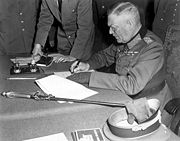
Allies of World War II
The Allies of World War II were the countries that opposed the Axis powers during the Second World War . Former Axis states contributing to the Allied victory are not considered Allied states...
nations in Reims
Reims
Reims , a city in the Champagne-Ardenne region of France, lies east-northeast of Paris. Founded by the Gauls, it became a major city during the period of the Roman Empire....
was signed on 7 May 1945, effective 23:01 CET
Central European Time
Central European Time , used in most parts of the European Union, is a standard time that is 1 hour ahead of Coordinated Universal Time . The time offset from UTC can be written as +01:00...
8 May. This date is commonly referred to as the V-E Day
Victory in Europe Day
Victory in Europe Day commemorates 8 May 1945 , the date when the World War II Allies formally accepted the unconditional surrender of the armed forces of Nazi Germany and the end of Adolf Hitler's Third Reich. The formal surrender of the occupying German forces in the Channel Islands was not...
(Victory in Europe Day) in most western European countries. The other World War II victory day, the V-J day (Victory in Japan Day) is commemorated in August, and is of considerably lesser significance in Europe.
However, the Soviet Union
Soviet Union
The Soviet Union , officially the Union of Soviet Socialist Republics , was a constitutionally socialist state that existed in Eurasia between 1922 and 1991....
's only representative in Reims was General Ivan Susloparov
Ivan Susloparov
Ivan Alekseyevich Susloparov was a Soviet general who served as the Military Liaison Mission Commander with the French government and the Allied Expeditionary Force in Europe in 1944-45. He is mostly known as the person who signed for the Soviet Union the German Instrument of Surrender on May 7,...
, the Military Liaison Mission Commander. General Susloparov's scope of authority was not entirely clear, and he had no means of immediate contact with the Kremlin
Kremlin
A kremlin , same root as in kremen is a major fortified central complex found in historic Russian cities. This word is often used to refer to the best-known one, the Moscow Kremlin, or metonymically to the government that is based there...
, but nevertheless decided to sign for the Soviet side. Susloparov was caught off guard; he had no instructions from Moscow. But if he did not sign, he risked a German surrender without Soviet participation. However, he noted that it could be replaced with a new version in the future. Joseph Stalin
Joseph Stalin
Joseph Vissarionovich Stalin was the Premier of the Soviet Union from 6 May 1941 to 5 March 1953. He was among the Bolshevik revolutionaries who brought about the October Revolution and had held the position of first General Secretary of the Communist Party of the Soviet Union's Central Committee...
was later displeased by these events, believing that the German surrender should have been accepted only by the envoy of the USSR Supreme command and signed only in Berlin and insisted the Reims protocol be considered preliminary, with the main ceremony to be held in Berlin, where Marshal Zhukov
Georgy Zhukov
Marshal of the Soviet Union Georgy Konstantinovich Zhukov , was a Russian career officer in the Red Army who, in the course of World War II, played a pivotal role in leading the Red Army through much of Eastern Europe to liberate the Soviet Union and other nations from the Axis Powers' occupation...
was at the time, as the latter recounts in his memoirs:
Therefore, another ceremony was organized in a surviving manor in the outskirts of Berlin late on 8 May, when it was already 9 May in Moscow due to the difference in time zones. Field-Marshal Wilhelm Keitel
Wilhelm Keitel
Wilhelm Bodewin Gustav Keitel was a German field marshal . As head of the Oberkommando der Wehrmacht and de facto war minister, he was one of Germany's most senior military leaders during World War II...
submitted the capitulation
Capitulation (surrender)
Capitulation , an agreement in time of war for the surrender to a hostile armed force of a particular body of troops, a town or a territory....
of the Wehrmacht
Wehrmacht
The Wehrmacht – from , to defend and , the might/power) were the unified armed forces of Nazi Germany from 1935 to 1945. It consisted of the Heer , the Kriegsmarine and the Luftwaffe .-Origin and use of the term:...
to Marshal Georgy Zhukov
Georgy Zhukov
Marshal of the Soviet Union Georgy Konstantinovich Zhukov , was a Russian career officer in the Red Army who, in the course of World War II, played a pivotal role in leading the Red Army through much of Eastern Europe to liberate the Soviet Union and other nations from the Axis Powers' occupation...
in the Soviet Army headquarters in Berlin-Karlshorst. To commemorate the victory in the war, the ceremonial Moscow Victory Parade
Moscow Victory Parade of 1945
The Moscow Victory Parade of 1945 was a victory parade held by the Soviet army after the defeat of Nazi Germany in the Great Patriotic War. It took place in the Soviet capital of Moscow, mostly centering around a military parade through Red Square...
was held in the Soviet capital on 24 June 1945 (four years and two days after the beginning of Operation Barbarossa - the invasion of the Soviet Union).
Celebration
During the Soviet Union's existence, 9 May was celebrated throughout the USSR and in the countries of the Eastern BlocEastern bloc
The term Eastern Bloc or Communist Bloc refers to the former communist states of Eastern and Central Europe, generally the Soviet Union and the countries of the Warsaw Pact...
. Though the holiday was introduced in many Soviet republics approximately between 1946 and 1950, it only became a non-labour day in Ukrainian (1963) and Russian (1965) SSRs. In the latter one, a weekday off (usually a Monday) was given starting 1966 if 9 May was to fall on a weekend (Saturday or Sunday).
The celebration of Victory Day continued during subsequent years. The war became a topic of great importance in cinema, literature, history lessons at school, the mass media, and the arts. The ritual of the celebration gradually obtained a distinctive character with a number of similar elements: ceremonial meetings, speeches, lectures, receptions and fireworks.
After the fall of the communism in Central and Eastern Europe
Revolutions of 1989
The Revolutions of 1989 were the revolutions which overthrew the communist regimes in various Central and Eastern European countries.The events began in Poland in 1989, and continued in Hungary, East Germany, Bulgaria, Czechoslovakia and...
, most former USSR countries retained the celebration, though it was not formally celebrated by some of them. In Russia during 1990s the May 9 was not celebrated massively, because Soviet-style mass demonstrations did not fit in with the way in which liberals who were in power in Moscow communicated with the country’s residents. The situation changed when Vladimir Putin
Vladimir Putin
Vladimir Vladimirovich Putin served as the second President of the Russian Federation and is the current Prime Minister of Russia, as well as chairman of United Russia and Chairman of the Council of Ministers of the Union of Russia and Belarus. He became acting President on 31 December 1999, when...
came to power. He started to promote the prestige of the governing regime and history, national holidays and commemorations all became a source for national self-esteem. Since then the Victory Day in Russia has increasingly been turning into a joyous celebration in which popular culture plays a great role. The celebration of the 60th anniversary of Victory Day in Russia in 2005 became the largest national and popular holiday since the collapse of the Soviet Union.
Countries in which 9 May is celebrated
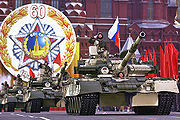
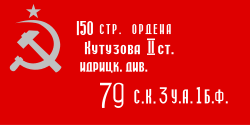
Public holidays in Armenia
Holidays in Armenia:HolidaysDateEnglish NameLocal NameTransliterationRemarks1 JanuaryNew Year DayԱմանորAmanorTradition6 JanuaryChristmas DayՍուրբ ԾնունդSurb TsnundReligious...
has officially recognised 9 May since 1946; Azerbaijan
Public holidays in Azerbaijan
Public holidays in Azerbaijan include the following:...
has officially recognised 9 May since 1946; Belarus
Public holidays in Belarus
National holidays in Belarus are classified into state holidays and other holidays and commemorative days, including religious holidays. Nine of them are non-working days. Other holidays and commemorative days...
has officially recognised 9 May since 1946 and considered it non-labor in the past; Bosnia and Herzegovina
Public holidays in Bosnia and Herzegovina
The holidays of Bosnia and Herzegovina include, in various jurisdictions:-Public Holidays:...
has officially recognised 9 May as the Victory Day over Fascism and considers it a non-working day.
- British Channel IslandsChannel IslandsThe Channel Islands are an archipelago of British Crown Dependencies in the English Channel, off the French coast of Normandy. They include two separate bailiwicks: the Bailiwick of Guernsey and the Bailiwick of Jersey...
of Jersey and
Jersey and  Guernsey were not liberated from German occupation until 9 May 1945, and
Guernsey were not liberated from German occupation until 9 May 1945, and  Sark on 10 May 1945, and celebrate those dates as their Liberation DayLiberation DayLiberation Day is a day, often a public holiday, that marks the liberation of a place, similar to an independence day. Liberation marks the date of either a revolution, as in Cuba, or the end of an occupation by another state, thereby differing from independence in the meaning of secession from...
Sark on 10 May 1945, and celebrate those dates as their Liberation DayLiberation DayLiberation Day is a day, often a public holiday, that marks the liberation of a place, similar to an independence day. Liberation marks the date of either a revolution, as in Cuba, or the end of an occupation by another state, thereby differing from independence in the meaning of secession from...
s. GeorgiaPublic holidays in Georgia-References:...
has officially recognised 9 May since 1946; German Democratic RepublicGerman Democratic RepublicThe German Democratic Republic , informally called East Germany by West Germany and other countries, was a socialist state established in 1949 in the Soviet zone of occupied Germany, including East Berlin of the Allied-occupied capital city...
recognised Tag des Sieges (Victory Day) on 9 May as a public holiday between 1975 and the end of the republic in 1990. Earlier, the Tag der Befreiung (Day of liberation) was celebrated on 8 May as a public holiday, from 1950 to 1966, and on the 40th anniversary in 1985. GermanyPublic holidays in GermanyExcept for the national holiday , public holidays in Germany are determined by the federal states.Notes on the tableGood Friday and Holy Saturday are silence holidays by law.- Custom about holidays :...
does not officially recognise 9 May as a holiday. However, celebrations continue to take place in some areas of the former German Democratic RepublicGerman Democratic RepublicThe German Democratic Republic , informally called East Germany by West Germany and other countries, was a socialist state established in 1949 in the Soviet zone of occupied Germany, including East Berlin of the Allied-occupied capital city...
. Also, on 8 May, the German state of Mecklenburg-Vorpommern since 2002 has recognised a commemorative day Tag der Befreiung vom Nationalsozialismus und der Beendigung des 2. Weltkrieges (Day of Liberation from National Socialism, and the End of the Second World War). IsraelPublic holidays in IsraelNote: for exact dates in the Gregorian calendar see Jewish holidays 2000-2050.Israeli law designates 9 days of official holiday during the year. Of these, Independence Day is supposed to be observed by all citizens, while others are Jewish religious holidays which non-Jews or non-Jewish communities...
has officially recognised 9 May since 2000. Kazakhstan has officially recognised 9 May since 1947. It's a non-working day. The holiday is sometimes celebrated in connection with other national holidays on 10 and 11 May. KyrgyzstanPublic holidays in KyrgyzstanThis is the list of public holidays in Kyrgyzstan:* January 1 – New Year's Day* January 7 – Russian Orthodox Christmas* February 23 - Fatherland Defender's Day* March 8 – Women's Day* March 21 – Nooruz, Muslim spring festival...
has officially recognised 9 May since 1946; MoldovaPublic holidays in MoldovaPublic holidays in the Republic of Moldova are the celebrated non working days established by the Government of the Republic of Moldova and valid for the whole territory of the country. Autonomous territorial units Gagauzia and Transnistria, as well cities, communes and cantonal authorities also...
has officially recognised 9 May since 1951; PolandPublic holidays in PolandHolidays in Poland are regulated by the Non-working Days Act of 18 January 1951 — Journal of Laws, No. 4 of 1960, item No. 28. The Act, as amended in 2010, currently defines thirteen public holidays....
celebrated since 1945 (until 1950 non-labour day) RussiaPublic holidays in RussiaThe following is the list of official public holidays recognized by the Government of Russia. On these days, government offices, embassies and some shops, are closed. If the date of observance falls on a Saturday or Sunday, the following Monday will be a day off in lieu of the holiday.-New Year...
has officially recognised 9 May since 1946 and considers it a non-working day even if it falls on a weekend (in which case any following Monday will be non-working); SerbiaPublic holidays in SerbiaThe public holidays in Serbia are defined by the Law of national and other holidays in the Republic of Serbia.- Bank Holidays :1 If one of the non-religious holidays falls on a Sunday, then the next working day is a non-working day....
celebrates 9 May as the Victory Day over Fascism but it's a working holiday. Still many people gather to mark the anniversary with the war veterans, including Serbian armySerbian Army-Objectives:The Serbian Army is responsible for:* deterring armed threats* defending Serbia's territory* participation in peacekeeping operations* providing humanitarian aid and disaster relief-Personnel:...
, Minister of Defense and the President. TajikistanPublic holidays in TajikistanHolidays in Tajikistan:DateEnglish NameLocal NameRemarksJanuary 1New Year's Day--March 8International Woman's Day--March 20 - March 22Persian New YearNavruz-May 1International Labour Day--May 9Victory Day-End of World War II...
has officially recognised 9 May since 1946; TurkmenistanPublic holidays in TurkmenistanPublic holidays in Turkmenistan fall into three main categories: holidays commemorating historical events and landmarks since the declaration of Turkmenistan's independence in 1991 ; traditional and religious holidays revived since...
has officially recognised 9 May since 1946; UkrainePublic holidays in UkrainePublic holidays in Ukraine*January 1 - New Year's Day*January 7 - Orthodox Christmas*March 8 - International Women's Day*Orthodox Easter*Holy Trinity Day - Orthodox Pentecost*May 1 & 2 - Labour Days...
has officially recognised 9 May since 1946 and considers it a non-working day even if it falls on a weekend (in which case any following Monday will be non-working); UzbekistanPublic holidays in UzbekistanHolidays in Uzbekistan:Fixed date:Variable date:*End of Ramazon Ramazon Hayit Eid al-Fitr*70 days later Qurbon Hayit Eid al-Adha...
has officially recognised 9 May from 1946 until 1988. Starting 1999, the holiday was restored as "Memorial/Remembrance Day;. YugoslaviaSocialist Federal Republic of YugoslaviaThe Socialist Federal Republic of Yugoslavia was the Yugoslav state that existed from the abolition of the Yugoslav monarchy until it was dissolved in 1992 amid the Yugoslav Wars. It was a socialist state and a federation made up of six socialist republics: Bosnia and Herzegovina, Croatia,...
officially recognised 9 May as the Victory Day over Fascism as an all-state non-working holiday.
Russophone
Russophone
A Russophone is literally a speaker of the Russian language either natively or by preference. At the same time the term is used in a more specialized meaning to describe the category of people whose cultural background is associated with Russian language regardless of ethnic and territorial...
populations in many world countries celebrate the holiday regardless of its local status. Many Russian communities in United States and Canada, also for example in Estonia, Latvia, Lithuania organize public gatherings and even parades on this day. In Europe, some multilanguage broadcasting television chains translate the "Victory speech" of the Russian president and the parade on Red Square
Red Square
Red Square is a city square in Moscow, Russia. The square separates the Kremlin, the former royal citadel and currently the official residence of the President of Russia, from a historic merchant quarter known as Kitai-gorod...
.
Soviet and post-Soviet symbols associated with the Victory Day
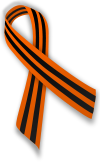
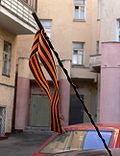
- Victory BannerVictory BannerThe Soviet Banner of Victory is the banner raised by the Red Army soldiers on the Reichstag building in Berlin, on April 30, 1945. It was raised by three Soviet soldiers: Alexei Berest, Mikhail Yegorov, and Meliton Kantaria, from Ukraine, Russia, and Georgia respectively.The Victory Banner, made...
- Ribbon of Saint GeorgeRibbon of Saint GeorgeThe Ribbon of St George or St. George's Ribbon constitutes one of the most recognised and respected symbols of military valour in modern Russia. It is widely associated with the commemoration of World War II and especially with the units who were awarded the collective Guard battle honours during...
, colloquially known as George's Ribbon (Георгиевская ленточка): originally associated with the Order of St. GeorgeOrder of St. GeorgeThe Military Order of the Holy Great-Martyr and the Triumphant George The Military Order of the Holy Great-Martyr and the Triumphant George The Military Order of the Holy Great-Martyr and the Triumphant George (also known as Order of St. George the Triumphant, Russian: Военный орден Св...
(officers) and the St. George Cross (enlisted ranks) of the Russian EmpireRussian EmpireThe Russian Empire was a state that existed from 1721 until the Russian Revolution of 1917. It was the successor to the Tsardom of Russia and the predecessor of the Soviet Union...
, the nation's highest award for military valor. It was reintroduced in the Soviet Union and used for the Order of GloryOrder of GloryEstablished on 8 November 1943, the Order of Glory was an Order of the Soviet Union. It was awarded to non-commissioned officers and rank-and-file of the armed forces, as well as junior lieutenants of the air force, for bravery in the face of the enemy.The Order of Glory, which was modelled...
and the Medal For the Victory Over Germany in the Great Patriotic War 1941–1945. The Order of St. George was reintroduced in the Russian Federation in 2000 as a military award.
During the Victory Day parade 2010, President Dmitry Medvedev
Dmitry Medvedev
Dmitry Anatolyevich Medvedev is the third President of the Russian Federation.Born to a family of academics, Medvedev graduated from the Law Department of Leningrad State University in 1987. He defended his dissertation in 1990 and worked as a docent at his alma mater, now renamed to Saint...
and many other VIPs were seen wearing the commemorative ribbon on the lapel of their jackets.
Soviet Union
| File:Ordervictory rib.png>border|80px|Order of Victory default Order of Victory Order of Victory The Order of Victory was the highest military decoration in the Soviet Union, and one of the rarest orders in the world. The order was awarded only to Generals and Marshals for successfully conducting combat operations involving one or more army groups and resulting in a "successful operation... desc none |
Order of Victory Order of Victory The Order of Victory was the highest military decoration in the Soviet Union, and one of the rarest orders in the world. The order was awarded only to Generals and Marshals for successfully conducting combat operations involving one or more army groups and resulting in a "successful operation... |
| File:Orderglory rib.png>border|40px|Medal For the Victory Over Germany in the Great Patriotic War 1941–1945 default Medal For the Victory Over Germany in the Great Patriotic War 1941–1945 desc none |
Medal For the Victory Over Germany in the Great Patriotic War 1941–1945 |
| File:Caputureberlin rib.png>border|40px|Medal For the Capture of Berlin default Medal For the Capture of Berlin desc none |
Medal For the Capture of Berlin |
| File:20 years of victory rib.png>border|40px|Medal For the Twentieth Anniversary of the Victory Over Germany in the Great Patriotic War 1941–1945 default Medal For the Twentieth Anniversary of the Victory Over Germany in the Great Patriotic War 1941–1945 desc none |
Medal for the 20th Anniversary of the Victory in the Great Patriotic War of 1941–1945 |
| File:30 years of victory rib.png>border|40px|Юбилейная медаль «Тридцать лет Победы в Великой Отечественной войне 1941–1945 гг.» default Юбилейная медаль «Тридцать лет Победы в Великой Отечественной войне 1941–1945 гг.» desc none |
Medal for the 30th Anniversary of the Victory in the Great Patriotic War of 1941–1945 |
| File:40 years of victory rib.png>border|40px|Юбилейная медаль «Сорок лет победы в Великой Отечественной войне 1941–1945 гг.» default Юбилейная медаль «Сорок лет победы в Великой Отечественной войне 1941–1945 гг.» desc none |
Medal for the 40th Anniversary of the Victory in the Great Patriotic War of 1941–1945 |
Russia
| File:50 years of victory rib.png>border|40px|Медаль «50 лет Победы в Великой Отечественной войне 1941–1945 гг.» default Медаль «50 лет Победы в Великой Отечественной войне 1941–1945 гг.» desc none |
Medal for the 50th Anniversary of the Victory in the Great Patriotic War of 1941–1945 |
| File:60 years of victory rib.png>border|40px|Медаль 60 лет Победы в Великой Отечественной войне 1941–1945 гг. default Медаль «60 лет Победы в Великой Отечественной войне 1941–1945» desc none |
Medal for the 60th Anniversary of the Victory in the Great Patriotic War of 1941–1945 |
Ukraine
| File:60 years of victory rib.png>border|40px|Медаль 60 лет Победы в Великой Отечественной войне 1941–1945 гг. default Медаль «60 лет Победы в Великой Отечественной войне 1941–1945» desc none |
Medal for the 60th Anniversary of the Victory in the Great Patriotic War of 1941–1945 |
Kazakhstan
| File:60 victory rib.png>40px|Медаль 60 лет Победы в Великой Отечественной войне 1941–1945 гг. (Казахстан) defaultМедаль «60 лет Победы в Великой Отечественной войне 1941–1945 гг.» (Казахстан) desc none |
Medal for the 60th Anniversary of the Victory in the Great Patriotic War of 1941–1945 |
See also
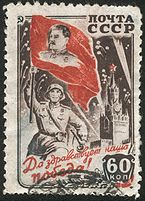
- 2008 Moscow Victory Day Parade
- End of World War II in EuropeEnd of World War II in EuropeThe final battles of the European Theatre of World War II as well as the German surrender to the Western Allies and the Soviet Union took place in late April and early May 1945.-Timeline of surrenders and deaths:...
- German Instrument of Surrender, 1945German Instrument of Surrender, 1945The German Instrument of Surrender was the legal instrument that established the armistice ending World War II in Europe. It was signed by representatives of the Oberkommando der Wehrmacht and the Allied Expeditionary Force together with the Soviet High Command, French representative signing as...
- Minute of SilenceMinute of SilenceMinute of Silence was a joint radio and TV program in the Soviet Union broadcast on at 6:00 pm on May 9, the day of the victory of the Soviet Union in the second world war. It was first broadcast on Soviet Central Television in 1965, 20 years after the Allied victory over Nazi Germany...
- Victory DayVictory DayVictory Day is a common name of many different public holidays in various countries to commemorate victories in important battles or wars in the countries' history.- April 30 in Vietnam :...
in other countries - Victory in Europe DayVictory in Europe DayVictory in Europe Day commemorates 8 May 1945 , the date when the World War II Allies formally accepted the unconditional surrender of the armed forces of Nazi Germany and the end of Adolf Hitler's Third Reich. The formal surrender of the occupying German forces in the Channel Islands was not...
- Victory over Japan DayVictory over Japan DayVictory over Japan Day is a name chosen for the day on which the Surrender of Japan occurred, effectively ending World War II, and subsequent anniversaries of that event...
- Hero cityHero CityHero City is a Soviet honorary title awarded for outstanding heroism during the German-Soviet War of 1941 to 1945. It was awarded to twelve cities of the Soviet Union. In addition the Brest Fortress was awarded an equivalent title of Hero-Fortress...
- PobediteliPobediteliPobediteli is a free and non-profit Russian project, celebrating the 60th anniversary of victory in World War II, with the goal of congratulating those who won the German-Soviet War for the Soviet Union...
External links
- Interactive map of the Great Patriotic War between the USSR and Nazi Germany
- Tanks in the streets of Moscow as Russia prepares to put on a show of military might for 2010 Victory Day parade
- United in Victory Russia, the UK and the U.S. commemorated their WWII victory together on Red Square (slideshow)

